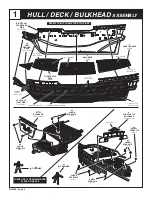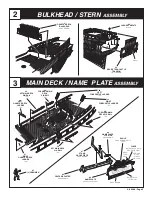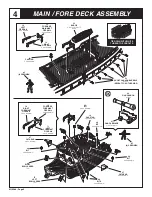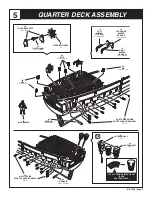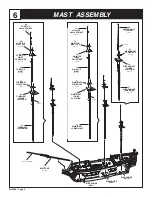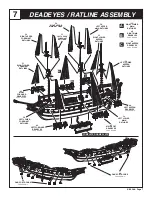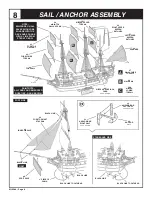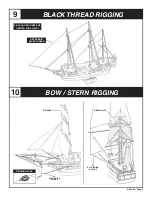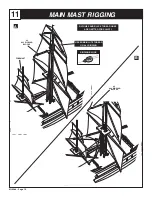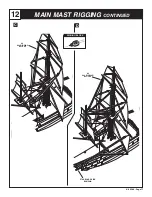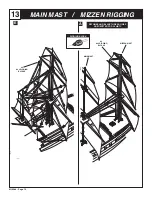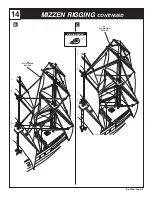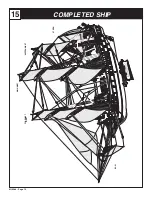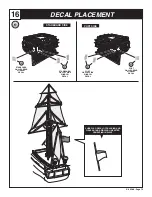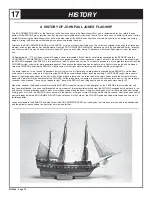
HISTORY
17
Red Brown
Dark Brown
Light Brown
Black
Red
White
Gray
Wood
Tan
Bright Blue
Gold
This paint guide is provided to complete this kit
as shown on the box.
Ce guide de peintures est fourni pour reproduire le modèle
réduit qui apparaît sur la boîte.
Rouge brun
Brun foncé
Brun clair
Noir
Rouge
Blanc
Gris
Bois
Havane
Bleu brillant
Or
* Study the assembly drawings.
* Each plastic part is identified by a number.
* In the assembly drawings, some parts will be
marked by a star (
★
) to indicate chrome
plated plastic.
* For better paint and decal adhesion, wash
the plastic parts in a mild detergent solution.
Rinse and let air dry.
* Check the fit of each piece before
cementing in place.
* Use only cement for polystyrene plastic.
* Scrape plating and paint from areas
to be cemented.
* Allow paint to dry thoroughly before
handling parts.
* Any unused parts may be discarded.
DECAL APPLICATION INSTRUCTIONS
1. Cut desired decal from sheet.
2. Dip decal in water for a few seconds.
3. Place wet decal on paper towel.
4. Wait until decal is movable on paper backing.
5. Place decal in position on model, face up and
slide backing away.
6. Press out air bubbles with a soft damp cloth.
7. Milkiness that may appear is for better decal
adhesion and will dry clear. Wipe away any
excess adhesive.
8. Do not touch decal until fully dry.
9. Allow the decals 48 hours to dry before
applying clear coat.
NOTE: Decals are compatible with
setting solutions or solvents.
READ THIS BEFORE YOU BEGIN
LIRE CE QUI SUIT AVANT DE COMMENCER
* Etudier les schémas de montage.
* Chaque pièce en plastique est identifiée par un numéro.
* Sur les schémas de montage, certaines pièces sont
marquées d'une étoile (
★
) pour indiquer qu'elles sont en
plastique chromé.
* Pour une meilleure prise de la peinture et des autocollants,
laver les pièces en plastique avec une solution détergente peu
concentrée. Les rincer et les laisser sécher à l'air.
* Vérifier que chaque pièce s'ajuste bien avant
de la coller en place.
* N'utiliser que de la colle pour polystyrène.
* Gratter les parties à coller pour enlever le chrome et la peinture.
* Laisser la peinture bien sécher avant de manipuler les pièces.
* Toute pièce inutilisée peut être jetée.
DIRECTIVES D'APPLICATION DES AUTOCOLLANTS
1. Découper l'autocollant désiré de la feuille.
2. Tremper l'autocollant dans de l'eau pendant quelques secondes.
3. Placer l'autocollant mouillé sur une serviette en papier.
4. Attendez que l'autocollant puisse être déplacé sur son
support en papier.
5. Mettre l'autocollant en position sur le modèle face sur
le dessus et faire glisser le support pour l'enlever.
6. Appuyer avec un chiffon doux humide pour éliminer les bulles d'air.
7. La substance laiteuse qui peut apparaître est destinée à
améliorer l'adhésion de l'autocollant et devient incolore au
séchage. Essuyer pour enlever tout excédent d'adhésif.
8. Ne pas toucher l'autocollant tant qu'il n'est pas bien sec.
9. Laisser l'autocollant sécher pendant 48 heures avant
d'appliquer une couche transparente.
REMARQUE: Les autocollants sont compatibles avec
les solutions de fixage ou les solvants.
BON HOMME RICHARD
KIT 0388
85038800200
If you have any questions or comments, call our hotline at:
(800) 833-3570
or, please write to:
Revell Inc Consumer Service Department, 1850 Howard Street Unit A, Elk Grove Village, Illinois 60007
Be sure to include the plan number (85038800200), part number, description, your return address and phone number.
Visit our website: www.revell.com
Revell Inc Elk Grove Village, IL. Copyright © 2010. All rights reserved.
Kit 0388 - Page 16
* REPEAT SEVERAL TIMES
* A REPETER PLUSIEURS FOIS
* CEMENT TOGETHER
* A COLLER
* REMOVE AND THROW AWAY
* A RETIRER ET JETER
* DO NOT CEMENT
* NE PAS COLLER
* DECAL
* DECAL COMANIE
* ASSEMBLY CAUTION
*ATTENTION D ASSEMBLEE
* OPTIONAL PARTS
* PIECES EN OPTION
*
REPEAT PROCEDURE
* REPETEZ LE PROCEDE
`
` `
`
`
`
The first USS Bon Homme Richard,
formerly Duc de Duras, was a frigate in
the Continental Navy. She was originally
and East Indianman, a merchant ship
built in France for the French East India
Company in 1775, for service between
France and the Orient. She was given
to commander John Paul Jones on
February 1779 by King Louis XVI of
France as a result of a loan to the United
States.On 23 September 1779 after a
bitter engagement with the HMS Serapis
the USS Bon Homme Richard was vic-
torious but shattered, on fire and leaking
badly defied all efforts to save her and
sank at 11:00 on 25 September 1779.
Your Monogram model features a detailed
deck, a custom display stand, 14 crew fig-
ures, molded rat lines, sails, black thread
and jute for rigging, chain and decals.
A HISTORY OF JOHN PAUL JONES' FLAGSHIP
The BON HOMME RICHARD was the flagship of John Paul Jones during the Revolutionary War, and is remembered for her role in the sea
battle with the SERAPIS which resulted in one of the most remarkable naval victories on record. There were no naval battles off the coast of the
United States during the Revolutionary War, but on the other side of the Atlantic John Paul Jones carried his country's new ensign to dazzling
heights, circling the British Isles while taking many prizes and raiding the coast.
Originally, the BON HOMME RICHARD was the DURAS, a worn-out French East India man. The ship was assigned to Jones by the French gov-
ernment and was renamed by him after Benjamin Franklin's POOR RICHARD'S ALMANAC, because, he said, he had obtained her by following
one of its maxims. She was a one deck vessel and had 21 guns on each side, mainly 12 pounders, with three 18 pounders aft near the water
line.
On September 23, 1779, off the east coast of England, Jones intercepted a British fleet of naval stores conveyed by the SERAPIS, and the
COUNTESS OF SCARBOROUGH. The later vessel was captured by one of Jones' squadron. About 7 o'clock in the evening, a moonlight night,
the RICHARD engaged the SERAPIS, a two deck vessel with 25 guns on each side, 10 of them 18 pounders, a much greater armament than the
RICHARD carried, and with far more penetrating power, To neutralize the advantage, Jones' policy was to fight at close range, and he maneu-
vered the RICHARD alongside the SERAPIS stem to stern with their gun muzzles touching and lashed the two ships together.
The battle raged on. Two of Jones' 18 pounders burst at the first fire; his lighter guns were gradually silenced by the SERAPIS, and the sides
of his vessel were shot away, so that shots from the SERAPIS passed through without touching anything. The RICHARD caught fire in several
places. A frightened petty officer let the 200 or 300 British prisoners loose and ran to tear down the colors. Jones broke the hysterical officer's
head with a pistol but while a lieutenant of the RICHARD set the prisoners to the pumps. In answer to British captains' inquiry if he was ready to
surrender, Jones replied " I have not yet begun to fight"' though the SERAPIS was firing heavily and his own guns were nearly still.
Meantime, however, the deadly musket fire from the RICHARD made the service of the upper guns on the SERAPIS almost sure death; and
they too were silenced; a cannon shot brought down her mainmast; the combustibles thrown from the RICHARD wrapped her upper deck in fire;
and a bucket of hand grenades set off a mass of cartridges strewn along the decks, killing or wounding nearly all of those around and wrecking
five big guns. Just then, the SERAPIS struck her colors, though four of her guns were still firing and the ship was sound. After three and one-half
hours of bloody battle the BON HOMME RICHARD was victorious. But 302 men of the RICHARD gad been killed or wounded, and she was in
terrible condition.
Jones transferred to the SERAPIS and tried to tow the BON HOMME RICHARD to a friendly port; but two days later she had to be abandoned
and the gallant shop sank about on hour after her crew had left her.

